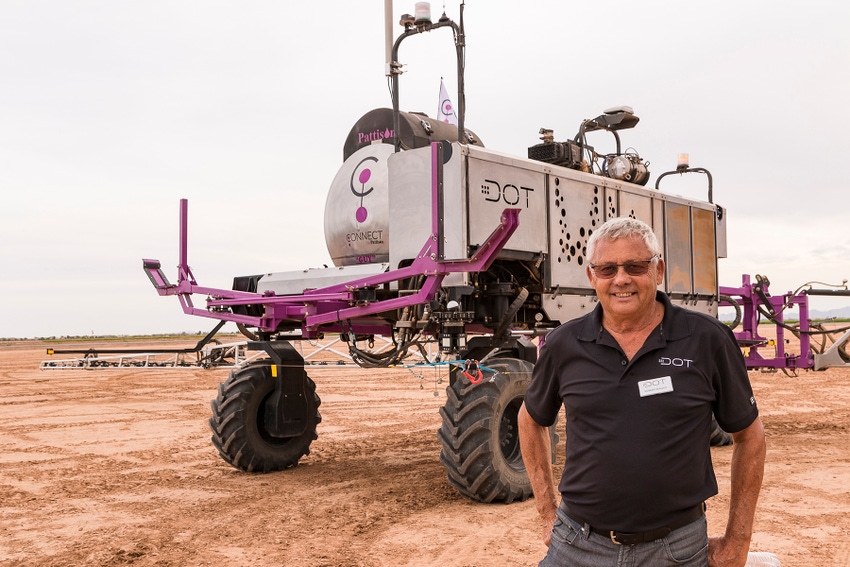
An autonomous farming platform made in Canada and tested at the University of Arizona is looking to make its prime-time debut in the United States.
DOT is a robotic farming platform built initially to handle large-acreage farming operations such as corn and canola on the Canadian prairie. The lightweight platform is designed to currently handle a few implements. Company officials are looking to other manufacturers to help increase the variety of implements compatible with the system.
Norbert Beaujot is the founder and brain behind the U-shaped platform, which was developed on a 3,000-are research farm in Canada. It takes its name from Beaujot’s mother, Dorothy.
The U-shaped configuration allows the machine to dock with implements, making it “one” with the diesel-powered, computer-controlled platform – replacing the need for a conventional tractor.
In 2014 he began thinking about an autonomous seeder and realized that if a powered platform could be adapted to facilitate other implements there might be a commercial value. Among these values could be:
Fuel savings of more than 20 percent;
Carbon dioxide emission reductions of 20 percent;
Improved equipment trade-in value;
Scalable equipment as the farm grows;
Cloud-based data storage included; and,
Greater on-farm efficiency.
Equipment sensors make it more accurate and attentive than human operators and can be programed for any field shape.
A farmer and engineer
Beaujot is the founder and president of SeedMaster. He is an engineer by training, and a farmer, who in 1991 pioneered an active-hydraulic, ground-following, individual row opener. He later developed a no-till air drill and has since developed other implements.
Robert Saik, Chief Executive Officer of the DOT retail division says the autonomous strategy will roll out in the U.S. marketplace this spring with additional offerings in 2020. Current partnerships include Connect, by Pattison, a spray rig configuration with a 60-foot sprayer; and, a spinner-spreader by New Leader Manufacturing.
DOT also partners with Raven, a manufacturer of precision agricultural products that includes the brain of the autonomous system.
Expansion into western U.S. markets, such as California and Arizona could come with the right partnerships with equipment manufacturers, Saik says. Testing on the platform was done at the University of Arizona’s facility in Maricopa under the leadership of Dr. Pedro Andrade, a precision agricultural specialist with the land grant university.
Beaujot says other partnerships could come over time as equipment manufacturers develop implements compatible with the unique system powered by a Tier 4 Cummins engine capable of powered four-wheel steering.
About the Author(s)
You May Also Like






